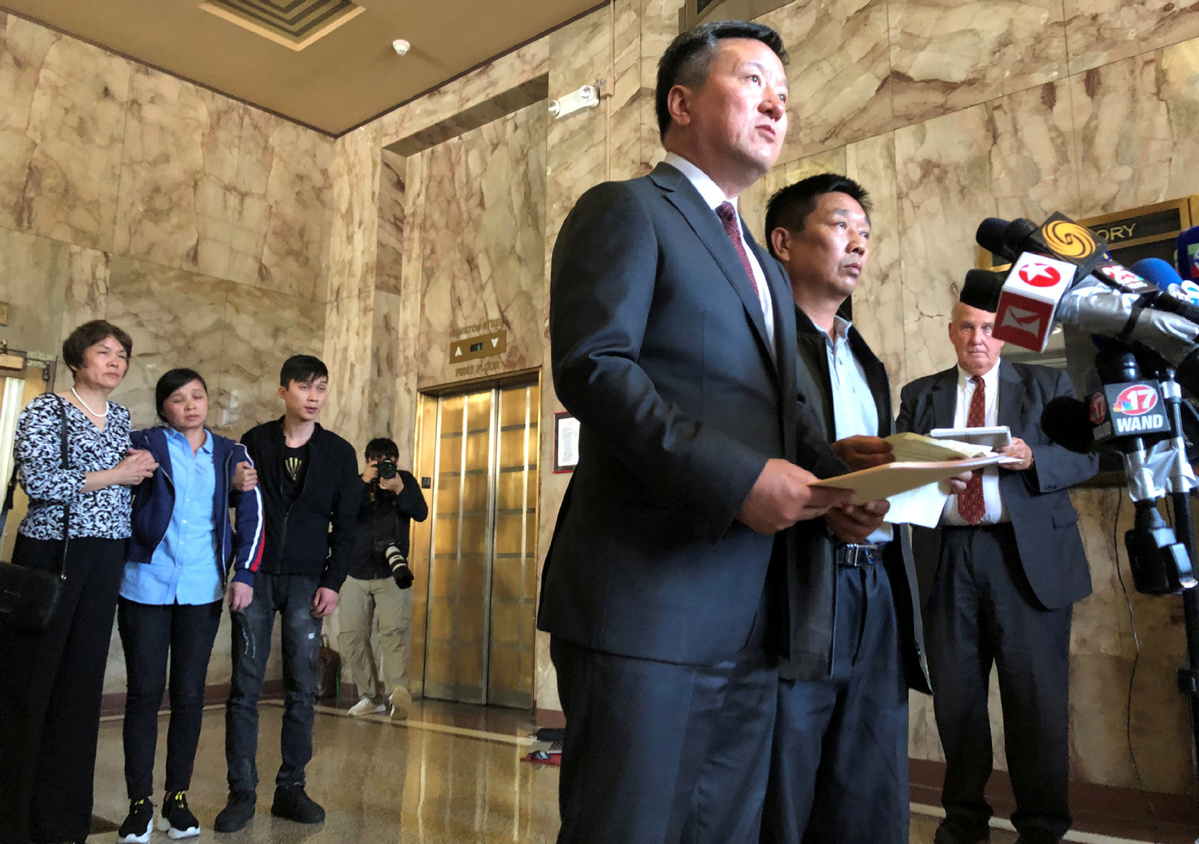Life setence for scholar's killer triggers controversy






Critics voice their anger on social media
Brendt Christensen smiled and looked at his lawyers sitting next to him in a federal courthouse in Peoria, Illinois, in the United States, after a judge sentenced him to life imprisonment on Thursday for killing Zhang Yingying, a young visiting scholar from a working-class family in China who went to the US in 2017.
Christensen, 30, escaped the death penalty after he admitted killing Zhang, 26, at his apartment.
He had lured her into his car by pretending to be an undercover police officer at a bus stop as she headed off to sign an off-campus apartment lease in June 2017.
According to prosecutors, Christensen raped, choked and stabbed Zhang before beating her to death and decapitating her.
She had only started her studies at the University of Illinois Urbana-Champaign three months earlier.
US authorities are still looking for Zhang's body as Christensen, a former graduate student at the same university, has not said how he disposed of the remains.

Although the verdict was covered mainly by US news teams, it was one of the most-discussed topics on Chinese social media during the weekend.
Many people voiced anger over how Christensen smiled after the verdict was delivered, showed no remorse, had never revealed what he did with Zhang's remains, and had escaped the death sentence.
In the view of many Chinese, who still believe strongly in the notion of "a life for a life", capital punishment in such cases is the only acceptable outcome.
Jing Tongmeng wrote on Sina Weibo: "He didn't show regret at all, not even an apology! How can we expect him to have a conscience? We still have no idea where Zhang's remains are! Did the murderer get away with death simply because of the jury's humanity? Isn't it supposed to be a life for a life? Are they still looking for some goodness in the murderer? So disappointed!"
The topic "the murderer of Zhang Yingying is sentenced to life imprisonment" had received some 750 million views and 92,000 comments on the social media platform by 2pm on Sunday, and each trending topic related to the case had been viewed hundreds of millions of times.
Toutiao, an online news portal, launched a survey asking the public if they accepted the judgment, and about 724,000 out of 808,000 respondents replied "no", accounting for 89.6 percent.
Ruan Chuansheng, a professor who has studied criminal laws and legal procedures in China and Western countries for more than 10 years at the Shanghai Administration Institute, said: "From ancient times to the present, 'a life for a life', or revenge, is an idea that many Chinese people often think about in homicide cases, especially those whose family members or close relatives are killed. Although some Westerners have similar ideas, their desire to see this idea fulfilled is not as strong as among Chinese people."
Christensen's life was saved by the US justice system, but many Chinese still cannot understand how this could allow a 12-member jury from different walks of life to make such an important decision, regardless of the number of US legal TV dramas they have watched.
MintTeaheyibei, a Sina Weibo user wrote: "A case that lasted two years ends just like this? I really don't understand how a 12-member jury, consisting of people who are not professionally related to the judicial crime field and have no knowledge of human social psychology, who are randomly selected from different sectors, races and genders, can make a judgment over a court judge? Isn't the jury system the weakest part of the US judicial system?"
Ruan said the differences between the legal systems in China and the US mean many Chinese find it difficult to accept or understand that the life sentence was delivered based on the verdict of the jury, adding that both countries have strengthened efforts to protect the legitimate rights of defendants and victims when dealing with such cases. However, sometimes Chinese may pay more attention to the victims.
"The prosecutors and Zhang's family had pushed for the death penalty, but the jury's decision on that had to be unanimous. Under US law, the federal judge should abide by the jury's decision, so a life sentence was given to the defendant. That's the US jury system, and the procedure was legitimate," Ruan said.
He added that the US is very careful when handing down the death penalty, as is China, adding that 21 states in the US have abolished capital punishment. The federal death penalty case against Christensen was the first of its kind in Illinois since the state struck capital punishment from its statute books in 2011 on grounds that death-penalty processes were too prone to error.
According to the US Death Penalty Information Center, the country carried out 25 executions last year. Some anti-death penalty activists in Illinois criticized what they said was the government's imposition of a death-penalty case in a non-death-penalty state.
Wang Xintong, a lawyer in Beijing specializing in criminal litigation at the King and Capital Law Firm, said that the jury system was born to prevent such bias and attempt to ensure rulings are completely fair. Wang worked with three major international criminal courts before joining the law firm.
"The US pays more attention to mental illness and defendants' emotions. The defendant in Zhang's case showed he had mental issues, which I think may have affected some jurors' understanding of the case," Wang said.
The defense attorneys highlighted the pressure and mental problems Christensen faces, saying the defendant is not a monster, but a man struggling with substance abuse, alcohol consumption and mental illness. According to the jury verdict form, two members believed that Christensen was taking antidepressants with alcohol and other drugs that could result in serious side effects, so he should not be sentenced to death.

In Wang's view, life imprisonment without parole is more serious for Christensen than the death penalty. In the US, if a person is sentenced to death, it does not mean he or she will be executed as quickly as defendants in China, she said.
In the US, a death penalty can take about 10 years to be carried out, as defendants and their lawyers can challenge the sentencing decision, and the execution procedures are highly complex and strict.
Between the reinstatement of the federal death penalty in 1988 and last year, 78 defendants were sentenced to death, of whom three have been executed and 12 removed from death row, according to the US Death Penalty Information Center.
Ken Kinsley, an Uber driver who lives in Champaign, Illinois, said: "Many don't realize how many people are on federal death row right now and how long it would take for Brendt Christensen to be executed (if the death penalty had been handed down). It might take more than a decade. In that sense, I think life in prison without the possibility of release is a better result."

Yase, a Facebook user posted on a page titled "Justice for Yingying": "People like Christensen and serial killers who show no remorse, no emotion, should be simply put to death and forgotten. Instead, they're glorified in some movies, such as Ted Bundy and American Psycho, where they look "awesomely evil".
After the sentencing, Zhang's father, Zhang Ronggao, said that until his daughter is brought home, "we will not have peace or closure." Zhang read his statement in Chinese, which was translated into English.
"We hope that every day he (Christensen) spends in prison, he feels the pain and suffering that we feel for the loss of Yingying," Zhang Ronggao said during a news conference on Thursday.
"Now that the trial is over and the jury has made its decision, we ask the defendant to unconditionally tell us what he knows about Yingying's location. If you have any humanity left in your soul, please help end our torment. Please let us bring Yingying home."
While US authorities said they would continue to search for Zhang Yingying's remains, the Chinese Consul General in Chicago said on Friday it would follow up her case and help her family in the US.
Ruan, the law professor in Shanghai, said: "I don't think the sentence will be changed or that the defendant will apply for a reduction if Zhang's body is found. But I understand Zhang's parents are eager for her remains to be found."
The family declined to be interviewed by China Daily about their plans.
Christensen seems certain to die in prison, and the lives of Zhang Yingying's parents have been changed forever since June 9, 2017 - the day that their daughter, who wanted to become a professor in crop sciences, climbed into Christensen's black Saturn Astra.
At the end of the sentencing, prosecutors asked to withdraw exhibit 11B, Zhang's journal, and gave it to her family. The last line she wrote before she was kidnapped and killed was, "Life is too short to be ordinary."
Zhang Yangfei contributed to this story.





























